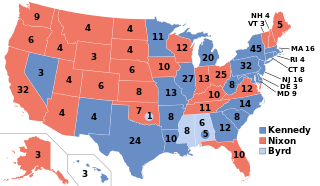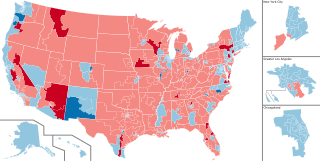
Presidential elections were held in the United States on November 7, 2000. Republican nominee, Governor George W. Bush of Texas, the eldest son of George H. W. Bush, narrowly defeated incumbent Democratic Vice President Al Gore. It was the fourth of five U.S. presidential elections, and the first since 1888, in which the winning candidate lost the popular vote, and is considered one of the closest U.S. presidential elections, with long-standing controversy about the result. Gore conceded the election on December 13 after the Supreme Court issued its decision.

Presidential elections were held in the United States on November 5, 1996. Incumbent Democratic President Bill Clinton and his running mate, incumbent Democratic Vice President Al Gore were re-elected to a second and final term, defeating the Republican ticket of former Senate Majority Leader Bob Dole and former Secretary of Housing and Urban Development Jack Kemp and the Reform ticket of businessman Ross Perot and economist Pat Choate.

Presidential elections were held in the United States on November 3, 1992. Democratic governor Bill Clinton of Arkansas defeated incumbent Republican president George H. W. Bush and independent businessman Ross Perot of Texas. The election marked the beginning of a period of Democratic dominance and the end of a period of Republican dominance in American presidential politics that began in 1968, and also marked the end of 12 years of Republican rule of the White House, as well as the end of the Greatest Generation's 32-year American rule and the beginning of the baby boomers' decades-long dominance lasting through the present day.

Presidential elections were held in the United States on November 8, 1988. The Republican Party's ticket of incumbent Vice President George H. W. Bush and Indiana senator Dan Quayle defeated the Democratic ticket of Massachusetts Governor Michael Dukakis and Texas senator Lloyd Bentsen.

Presidential elections were held in the United States on November 3, 1936. In the midst of the Great Depression, incumbent Democratic President Franklin D. Roosevelt defeated Republican governor Alf Landon of Kansas in a landslide victory. Roosevelt won the highest share of the popular vote (60.8%) and the electoral vote since the largely uncontested 1820 election. The sweeping victory consolidated the New Deal Coalition in control of the Fifth Party System.

Presidential elections were held in the United States on November 8, 1960. The Democratic ticket of Senator John F. Kennedy and his running mate, Senate Majority Leader Lyndon B. Johnson, narrowly defeated the Republican ticket of incumbent Vice President Richard Nixon and his running mate, U.N. Ambassador Henry Cabot Lodge Jr. This was the first election in which 50 states participated, marking the first participation of Alaska and Hawaii, and the last in which the District of Columbia did not. This made it the only presidential election in which the threshold for victory was 269 electoral votes. It was also the first election in which an incumbent president—in this case, Dwight D. Eisenhower—was ineligible to run for a third term because of the term limits established by the 22nd Amendment.

Presidential elections were held in the United States on November 4, 2008. The Democratic ticket of Barack Obama, the junior senator from Illinois, and Joe Biden, the senior senator from Delaware, defeated the Republican ticket of John McCain, the senior senator from Arizona, and Sarah Palin, the governor of Alaska. Obama became the first African American to be elected to the presidency. This was the first election since 1952 in which neither the incumbent president nor vice president was on the ballot, as well as the first election since 1928 in which neither ran for the nomination.

The Communist Party of India (Marxist) (abbreviated as CPI(M)) is a communist political party in India. It is the largest communist party in India in terms of membership and electoral seats, and one of the national parties of India. The party was founded through a splitting from the Communist Party of India in 1964 and it quickly became the dominant faction.

Presidential elections were held in the United States on November 2, 2004. Incumbent Republican President George W. Bush and his running mate, incumbent Vice President Dick Cheney, were re-elected to a second term. They narrowly defeated the Democratic ticket of John Kerry, a senator from Massachusetts, and his running mate John Edwards, a senator from North Carolina.

The 2002 United States House of Representatives elections were held on November 5, 2002, in the middle of President George W. Bush's first term, to elect U.S. Representatives to serve in the 108th United States Congress. This was the first congressional election using districts drawn up during the 2000 United States redistricting cycle on the basis of the 2000 census.

The 2000 United States House of Representatives elections were held on November 7, 2000, to elect U.S. Representatives to serve in the 107th United States Congress. They coincided with the election of George W. Bush as President of the United States. The Republican Party won 221 seats, while the Democratic Party won 212 and independents won two.

The 1992 United States House of Representatives elections were held on November 3, 1992, to elect U.S. Representatives to serve in the 103rd United States Congress. They coincided with the 1992 presidential election, in which Democrat Bill Clinton was elected president, defeating Republican incumbent President George H. W. Bush.
An independent, non-partisan politician, or non-affiliated politician is a politician not affiliated with any political party or bureaucratic association. There are numerous reasons why someone may stand for office as an independent.

The 2008 United States elections were held on Tuesday, November 4, 2008, during the war on terror and the onset of the Great Recession. It was considered a Democratic wave election, with Democratic Senator Barack Obama of Illinois defeating Senator John McCain of Arizona by a wide margin, and the Democrats bolstering their majorities in both chambers of Congress, thereby marking the first time since 1992 in which the Democrats won Congress and the presidency in one election.

Presidential elections were held in the United States on November 6, 2012. Incumbent Democratic President Barack Obama and his running mate, incumbent Vice President Joe Biden, were elected to a second term. They defeated the Republican ticket of former Governor of Massachusetts Mitt Romney and U.S. Representative Paul Ryan of Wisconsin, who later became Speaker of the House of Representatives.

Presidential elections were held in the United States on November 8, 2016. The Republican ticket of businessman Donald Trump and Indiana governor Mike Pence defeated the Democratic ticket of former secretary of state and former first lady Hillary Clinton and Virginia junior senator Tim Kaine, in what was considered one of the biggest political upsets in American history. It was the fifth and most recent presidential election in which the winning candidate lost the popular vote. It was also the sixth and most recent presidential election in U.S. history in which both major party candidates were registered in the same home state; the others have been in 1860, 1904, 1920, 1940, and 1944.

The 2016 United States elections were held on Tuesday, November 8, 2016. Republican nominee Donald Trump defeated Democratic former Secretary of State Hillary Clinton in the presidential election, while Republicans retained control of Congress. This marked the first time Republicans won or held unified control of the presidency and Congress since 2004, and would not do so again until 2024.

Presidential elections were held in the United States on November 3, 2020. The Democratic ticket of former vice president Joe Biden and the junior U.S. senator from California Kamala Harris defeated the incumbent Republican president Donald Trump, and vice president Mike Pence. The election took place against the backdrop of the global COVID-19 pandemic and related recession. The election saw the highest voter turnout by percentage since 1900. Biden received more than 81 million votes, the most votes ever cast for a candidate in a U.S. presidential election.

The 2022 United States House of Representatives elections were held on November 8, 2022, as part of the 2022 United States elections during incumbent president Joe Biden's term. Representatives were elected from all 435 U.S. congressional districts across each of the 50 states to serve in the 118th United States Congress, as well as 5 non-voting members of the U.S. House of Representatives from the District of Columbia and four of the five inhabited insular areas. Numerous other federal, state, and local elections, including the 2022 U.S. Senate elections and the 2022 U.S. gubernatorial elections, were also held simultaneously. This was the first election after the 2020 redistricting cycle.

The 2024 United States House of Representatives elections were held on November 5, 2024, as part of the 2024 United States elections, to elect representatives from all 435 congressional districts across each of the 50 U.S. states, as well as 6 non-voting delegates from the District of Columbia and the inhabited U.S. territories to the United States House of Representatives. Special elections have also been held on various dates in 2024. Numerous other federal, state, and local elections, including the U.S. presidential election and elections to the Senate, were also held on this date. The winners of this election will serve in the 119th United States Congress, with seats apportioned among the states based on the 2020 United States census.



















